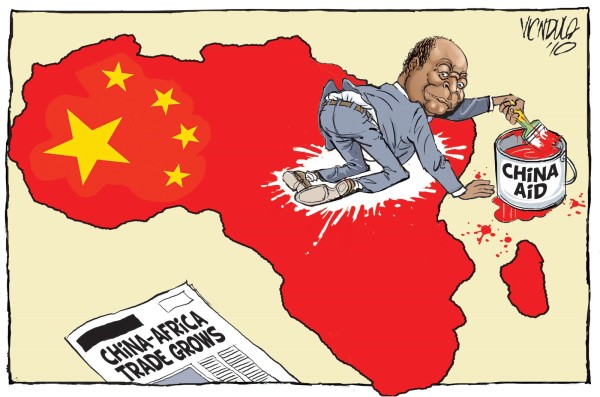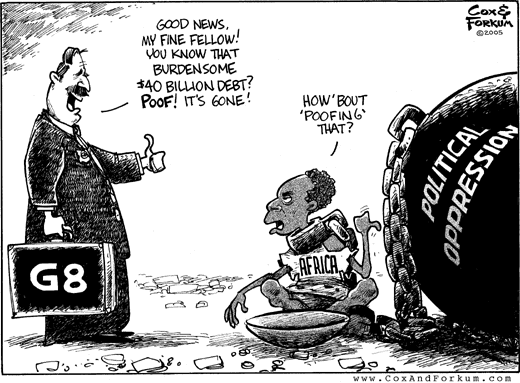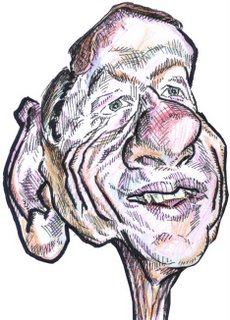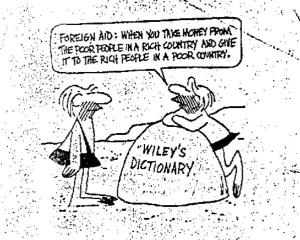This week’s class was on aid, an infamous topic if you ask me but the class was nonetheless very interesting and quite informative. The lecture focused on: who gives aid, why they bother at all, whether their reason changes with time and how aid is given. Against this background, the focus was on the activities of the traditional OECD-DAC donors: US, France, Germany, UK, Japan and others. This part of the class no doubt was familiar to most of us because of CAD and the fact that one of the assignments was on the effectiveness of aid which most of us answered. It was refreshing all the same.
 However, I was quite disappointed when almost nothing was said about the new emerging donors: China, Mexico, India etc. Apparently information or statistics on the amounts and the kinds of aid they give is lacking although it is common knowledge of their ever growing presence in most developing countries. China in particular is very visible in many African countries and since the continent has been a test case for most discussion in this module, I was hoping the lecture would somehow clarify some of the not so flattering things one hears in the news.
However, I was quite disappointed when almost nothing was said about the new emerging donors: China, Mexico, India etc. Apparently information or statistics on the amounts and the kinds of aid they give is lacking although it is common knowledge of their ever growing presence in most developing countries. China in particular is very visible in many African countries and since the continent has been a test case for most discussion in this module, I was hoping the lecture would somehow clarify some of the not so flattering things one hears in the news.
 The lecture made it clear poverty reduction is the main focus of donors now but their mission is still being tackled through the promotion of democracy and the good governance agenda. The big question continues to be about the effectiveness of aid and the value for money since the same trend of performance as seen with previous approaches seem to be lingering on. Developing countries continue to be heavily dependent on aid, some are creating democracies with authoritarian features (hybrid or ‘chameleon’ regimes) just to merit aid while others are opting for aid motivations that suit their interest. With this stationary pace of progress, I wonder why the donors just don’t give up on us. Sometimes I think it has more to do with our perpetual hold on history-the ultimate source of the ‘guilt card’ than any interest or bond they may have with the region.
The lecture made it clear poverty reduction is the main focus of donors now but their mission is still being tackled through the promotion of democracy and the good governance agenda. The big question continues to be about the effectiveness of aid and the value for money since the same trend of performance as seen with previous approaches seem to be lingering on. Developing countries continue to be heavily dependent on aid, some are creating democracies with authoritarian features (hybrid or ‘chameleon’ regimes) just to merit aid while others are opting for aid motivations that suit their interest. With this stationary pace of progress, I wonder why the donors just don’t give up on us. Sometimes I think it has more to do with our perpetual hold on history-the ultimate source of the ‘guilt card’ than any interest or bond they may have with the region.
On the question of why donors continue to deal with countries who seem not to be wholly interested in promoting democracy, Brown (2011) discusses why this is so but from the perspective of donor officials. To him, donor officials continue to over indulge their recipient regimes and as such disregard the obvious shortcomings of the democracy at play. I have always been disgusted with the idea of the international community measuring the progress of developing countries especially those in Sub-Saharan Africa on the basis of their electoral progress. This article goes beyond the election bit to offer more donor excuses. Interesting! To Brown, donor officials offer apologies and remain uncritical of the progress of their recipient regimes as they: (1) focusing on election day (free elections), rather than the campaign and conditions as a whole (fair elections), and ignoring civil and political rights more generally; (2) setting the standard very low (do not expect too much); and (3) setting a long time horizon (do not expect it too soon) pg. 513.
Some of the countries Brown used as case study, Rwanda in particular is hailed by the international community as a model post-conflict country that is doing very well in the lines of democracy. Who exactly are we kidding? How can these countries become better when their mistakes are not pointed out? Some countries with similar situations are making steady steps towards the consolidation of democracy, why are some given a pat on the back when clearly they are not trying enough? To me this weird relationship between these recipient regimes and their donors (officials) can be liken to a parent who refuses to correct his/her child for fear of losing the child. The end result is unimaginably horrible, a pompous kid who will end up hating you anyway. Why take that risk?
Brown identified four reasons that explains why donor officials take the risk even when they are clearly aware of the consequences: (1) their quasi-permanent newness on the job, which promotes naïveté´ and short-sightedness; (2) the strength of inertia and the lack of political will that prevents more vigorous, concerted action; (3) distinct career disincentives from taking a more critical approach; and (4) a psychological need to feel that their work with the host government is having a positive impact pg.527.
 I find these reasons inexcusable but reasonable anyway. Some of these reasons are somewhat beyond the control of donor officials. There is nothing altruistic about business, the motivating factor is always the profit. This apply to most of these donor officials, the young ones especially who are in the process of charting their career. Why rock the boat when it can cost you your career? Sir Edward Clay is hailed by most for openly criticising the corrupt politicians in Kenya, but a good look at the situation presents a fine gentlemen who have already made his mark in life. He can of course afford to adopt the confrontational approach, get chased out of Kenya and would still be fondly remembered and given other opportunities if he is interested. Most donor officials unfortunately do not have the same leverage. Its ok I think, to cut them some slack.
I find these reasons inexcusable but reasonable anyway. Some of these reasons are somewhat beyond the control of donor officials. There is nothing altruistic about business, the motivating factor is always the profit. This apply to most of these donor officials, the young ones especially who are in the process of charting their career. Why rock the boat when it can cost you your career? Sir Edward Clay is hailed by most for openly criticising the corrupt politicians in Kenya, but a good look at the situation presents a fine gentlemen who have already made his mark in life. He can of course afford to adopt the confrontational approach, get chased out of Kenya and would still be fondly remembered and given other opportunities if he is interested. Most donor officials unfortunately do not have the same leverage. Its ok I think, to cut them some slack.
But then again, as the ears and eyes of the donor community, it doesn’t make it right to just look on! Recipient countries obviously understand what is at stake and so does the donor community, but both have resolved do very little or nothing since whatever they are doing is clearly not satisfactory. 
Reference
Brown, S., 2011. ‘Well, what can you expect?’:donor officials’ apologetics for hybrid regimes in Africa. Democratization, 18(2), pp. 512-534.
Carothers, T., 2009. Democracy Assistance: Political vs. Developmental?. Journal od Democracy, 20(1), pp. 5-19.





